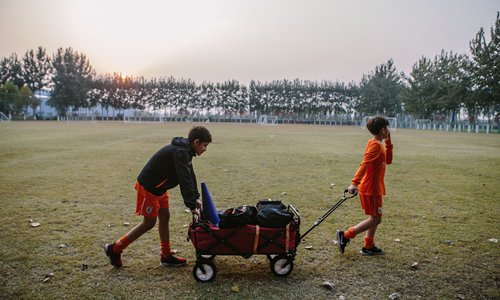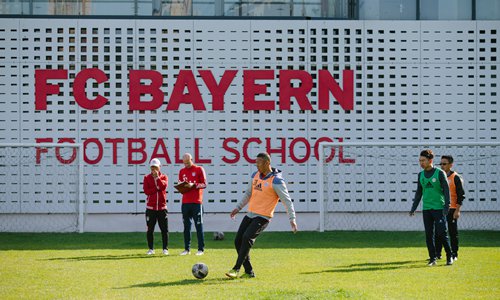
From the People’s Daily app.
This is Story in the Story.
China launched its soccer reform program in 2015 and unveiled an ambitious blueprint in April 2016 to get 50 million children and adults playing soccer by the end of the decade, with the ultimate goal of becoming a "world soccer power" by 2050.
To achieve the goal, soccer clubs have been working on building up youth soccer systems in their own ways.
More overseas clubs have opened soccer schools in China, and cooperated with different levels of government to provide assistance in building soccer talent. In addition to FC Bayern's soccer schools, Guangzhou Evergrande Taobao Football Club built a school with Real Madrid in 2012. FC Barcelona also opened a soccer school in Qingdao.
Meanwhile, domestic top clubs, some of which already have solid youth systems, are finding new methods to improve the current systems.
Today’s Story in the Story will look at the country’s soccer reform plan and the cooperation between the world-class clubs and the Chinese government to build soccer schools and train the best players and coaches.

Two U11 players in Luneng Taishan Football School prepare to go home after training. (Photo: Global Times)
Sun Pengfei, a soccer teacher in the countryside of East China's Shandong Province, can now coach his students on how to play soccer with German theories and techniques.
Sun, from Tinglan Middle School in suburban Qingdao, has just finished a week of soccer training held by German soccer giant FC Bayern Munich in its Qingdao Football School on October 26.
"The training was very useful. I used to have limited knowledge of soccer training, but the coaches from Germany explained the practical tactics thoroughly," Sun said.
In Sun's school, there are 20 students aged 14 and 15 who train every day. Sun hopes the knowledge he learned could be applied in real matches.
Chang Zhengjian, a soccer teacher from Dexian Road Primary School of Qingdao, is directing 12 teachers to conduct his demonstration in the final test for Bayern's coach training certification.
The aim of the test is to simulate real youth coaching. Chang must design a short training program to demonstrate the knowledge he retained over the past week.
According to Chang, during the training the teachers have a two-hour lesson on training theories in the morning and another two-hour practice on the pitch in the afternoon.
The morning lessons teach the types of drills children of different ages should do. And the afternoon lessons consist of 4-6 drills, he said.
Coaching soccer teachers is a part of FC Bayern's work in China to support the growth of the Chinese youth system. The club's Qingdao football school, in suburban Qingdao in the newly built Sino-German Eco Park, has mainly taken the role.
The main building of the school is decorated by an out-of-commission train engine. Besides the engine stands a scarlet billboard, showing the club's iconic blue-white diamond-pattern logo.
Qingdao is closely connected with Germany due for historical reasons. In Eco Park, everything is German, except for the Heineken beer at the buffet of the German hotel.
Since 2017, youth coaches from FC Bayern have trained 727 soccer teachers at the football schools in Qingdao and Shenzhen, South China's Guangdong Province.

Christopher Loch, FC Bayern coach of international programs, is directing soccer teachers at Bayern's Football School in Qingdao, East China's Shandong Province. (Photo: Global Times)
Christopher Loch is the tutor and judge for Chang and Sun this week. He said that the Chinese coaches worked hard, but only two or three of them were really good. He carefully observed each teacher's demonstration and filled tables with his assessment.
Matthias Brosamer, head of sports in China, Japan and Korea of FC Bayern, said that in Germany, many coaches used to be soccer players when they were young. But in China, most soccer teachers did not have the experience of soccer training themselves, so even though they understand the theories, they lack the sense of how to react on the field with the ball.
In addition to the Qingdao project, FC Bayern has announced it will build two full-time FC Bayern football schools in Shenzhen and Taiyuan, North China's Shanxi Province. The Shenzhen school, for instance, will be able to have around 1,350 children living, playing soccer and getting a dual Chinese and German education.
"Today, our main drills involve passing and moving to third position," wrote Li Ye, a young player at Shandong Luneng Taishan Football School, in his training diary, which is displayed in the school's museum.
Li is a player for the U11 team at the Shandong Luneng Taishan Football Club, a top Chinese soccer club. Its youth system is believed to be the best in China.
Tan Zhaohui, who is also the executive vice-president of the school, said that the school enrolls young players by considering their soccer skill, academic scores, passion for soccer, and their parents' determination in supporting their children to play soccer professionally.
In China, many parents still want their children to go to university and have a stable job, especially when they are the only children in the family. Soccer is not in the plan they design for their children.
Therefore, in addition to soccer training, the school also provides qualified academic education.
In the past 16 years, 280 graduates in the school enrolled into universities with their athletic talent, including top ones such as Zhejiang University and Shandong University.
China's men's soccer team has qualified for the World Cup finals once, in 2002.
The Ministry of Education in February 2017 announced a plan to raise the number of "schools characterized by soccer" to 20,000 by the end of the year and 50,000 by 2025. The Chinese Football Association (CFA) has called for opening 10,000 soccer kindergartens by 2020.
Tan noted that after the soccer reform, the CFA founded 12 professional committees, including a committee about youth systems, in which Luneng and other clubs have been providing suggestions for policy adjustments to help the CFA be more pragmatic.
"As a State-owned company, the more Luneng works on the youth system in China, the more responsible we feel," Tan said.
(Produced by Nancy Yan Xu, Grace Xinyi Song, Lance Crayon, Brian Lowe and Da Hang. Music by: bensound.com. Text from Global Times.)


